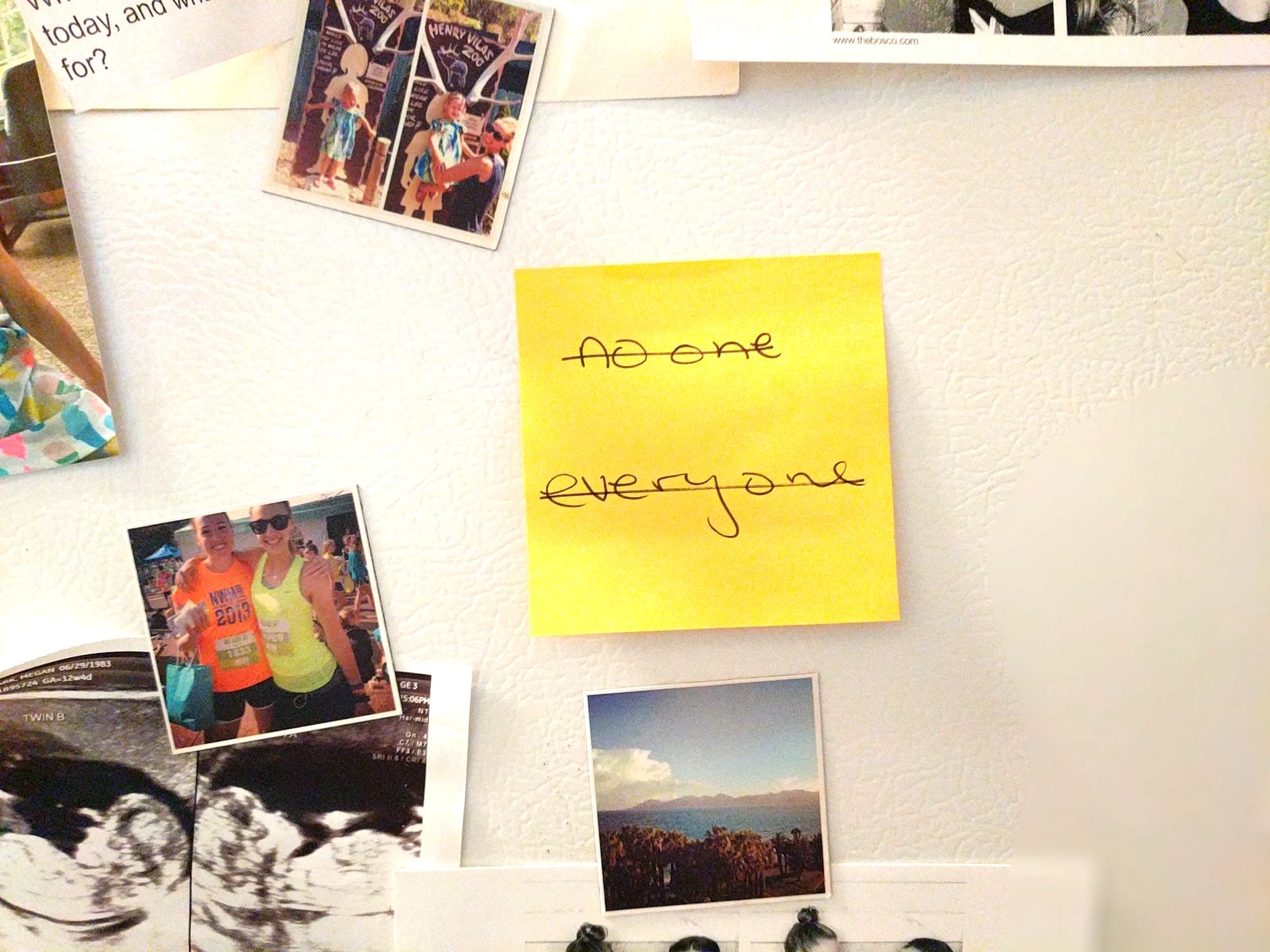So much of living an intentional—and yes, stylish—life is thanks to confidence. And we can’t feel confident if we’re constantly berating ourselves with negative self-talk, or externalizing our own shit onto the world at large (and, spoiler: our loved ones). We need to learn how to stop negative self-talk in its tracks, before it stops us.
That’s why there are a few words I’m working to expunge from my vocabulary. Not in a “Ban bossy” way; censorship is really not my bag. Rather, these are words that I’ve found bring me down. Words that don’t help me do anything smarter, faster, or with more positivity. Words that don’t help me show up to my life in a way that supports my long-term goals of being a happy, fulfilled, successful, thriving person.
I’m sharing them here, not so you can blindly banish them from your own vocabulary, too. Instead, consider this a courtesy (wake-up) call: Ring ring…Are you your own worst enemy? Maybe!
Once you notice if you trip over any of these self-talk stumbling blocks, you can decide what and how you want to do things differently.
Below, how to stop negative self-talk by skipping these four words:
“no one / everyone”
On my fridge, a Post-it note sits stuck to my freezer door, the words “no one” and “everyone” written and scratched out, all scrawled in black Sharpie.
No, it’s not a shopping list. Instead, these are words that I’ve realized build up unrealistic comparisons that make feeling good about where I’m at in my life pretty much impossible.
Personally, it’s so easy for me to think, Everyone is farther along than me. No one lets this many avocados go bad. And on and on. This kind of talk is so dangerous because it forever pits you in a losing battle with the whole entire world. How exhausting, right?
Beyond that, it’s just straight-up false hyperbole! Yes, there are folks my age who started their blogs when I started Style Girlfriend and have turned them into huge, multi-person operations….and there are those who are still small like me, still figuring out how to churn out interesting, informative (and free) articles and still keep ahead of the rent. And there are FOR SURE other busy folks guilty of just as much avocadocide as me.
Releasing yourself from the “no one / everyone” mindset isn’t about judging your life like a horse race; it’s about remembering to come back to you and your story.
This dialogue danger zone extends to nothing and everything, too. Anyone who’s stood in front of a jam-packed closet and wailed, “I have nothing to wear” knows exactly what I’m talking about. You do literally have clothes to wear, so saying you have “nothing” to wear isn’t accurate, and it doesn’t help you take positive steps forward. That, or I guess you’ll be walking around naked.
The takeaway
Especially when complaining or simply feeling down, try not to speak, or think, about yourself in (losing) contrast to a monolithic bloc.
“need”
This one is kind of abstract. It’s not about direct needs – I need a pen. She needs a seat assignment before boarding the plane. Remember learning about the subjunctive in French or Spanish class (and probably others? Those are the only I took in school):
“I need for X to do Y.”
When I say I’m working on removing “need” from my vocabulary, I’m talking about the subjunctive “need.” The feeling that for me to be happy, I need for someone to interact with me in a different way.
Here’s an example in my own life that I’m still (like, every day still) trying to unpack:
When I’m feeling frustrated with habits and self-defeating attitudes I can’t seem to shake, I get angry and think, “I need my parents to understand all the ways they screwed me up.”
Now, my parents are wonderful, loving people who did their best to raise me to be a non-sociopathic member of society, and by all accounts, they passed that test (perhaps in a pass/fail grading system, but hey, that still counts).
What I’ve found is that the success rate on satisfying my subjunctive need—either with my parents, or on my own— is exactly zero.
Byron Katie, a self-help guru whose books I’m not even going to name for you because they sound cheesy af (but are so, so good) talks about the importance of turning around your “need” statements. “I need her to love me better..” becomes “I need to love myself better…”
It’s hokey, maybe, but it really works for me to remember that we can’t change anyone else by willing it into existence, and we certainly can’t talk someone into being a different person.
For me, when I’m externalizing my anger and frustration to make it about other people, and what I need them to do, that’s the time to turn it back on myself and ask how I can address something without involving that other person—since, guess what? I don’t control other people. And trust me, I’ve tried.
Instead, it’s more helpful for me to ask, How can I show up in a different way in this situation?
Does that mean that you can’t have a loving, respectful conversation with that friend who keeps putting you down in front of the group? Or the spouse who you wish would get along better with your mom? Of course not. It’s smart, though, to lead with how you feel, and ask them what they think a good solution. Not “I need you to do X, Y, Z.”
The takeaway
You can’t make anyone else be different, so why not work on what you can control…yourself?
“Should”
This one goes along with both of the ideas above. “I should be farther along because everyone else I know is doing great.” “I need my partner to be more thoughtful because we should have more romance in our relationship.”
When I say I “should” (or “shouldn’t”) do something, I can feel my forward-moving energy slam directly into a big ass mental brick wall.
What can make it worse is knowing that brick wall is paved with good intentions, since so many of our “should’s” are positive goals. Eating healthy! Exercising daily! Dressing in a way that instills confidence! Being a more loving partner!
Putting should in front of it, though, turns whatever the goal is on the back end of that “should” feel like a task, feel like work, feel like it’s going to be a hard slog. Instead, reframe what feels like an obstacle into an opportunity.
“I’m blessed to have access to all kinds of foods that will give me energy to take on the day.” “I’m lucky my body is healthy enough to work hard for me.” “I can’t wait to put on clothes that make me feel like a million bucks.” “Wow, my wife is so amazing, and I want her to know it.”
Of course, sometimes adding “should” is our brain/heart’s way of saying, “Hey, think this through. If you’re making this into a chore, maybe you really don’t want to do it.” If you find yourself thinking, “I really should work harder at my job…,” maybe it’s time to start thinking about finding a new job! Or at least identifying what it is that’s bringing you down about your current gig and figuring out if there’s a way to push it off your plate.
The takeaway
Evaluate the “should’s” in your life. Could you look at them in a new way, or are they trying to tell you you’re on the wrong track?
“But”
Okay, okay, this one is definitely on a conditional basis, but (see?!) hear me out.
Lately I’ve been thinking a lot about nuance. I don’t think I’m breaking any news in saying that we’re currently faced with a tidal wave of bad takes about situations that folks want to immediately label as black or white when in fact they’re ::ahem:: fifty shades of grey.
Here’s an example:
Sounds dumb, right?
We do this to ourselves, and those around us, too. “I got that raise, but I’m still overweight.” “My girlfriend’s great, but our sex life is meh.”
It feels more true to me that both sides of an equation merit equal consideration. Not to have one side canceled out by the other. That all parts are worth taking into account.
Usually that means it’s worth adding a third clause. “I got that raise, and I’m overweight, and that’s why I’m going to use that pay bump to finally pay for a trainer.” “My girlfriend’s great, and our sex life is important, so that’s why I’m going to bring it up with her tonight after dinner.”
We are the sum of our parts. Both sides of our equation.
The takeaway
Be willing to accept more nuance in your life. Things aren’t always (or even often!) so black and white.








